Report on Corporate Culture: Shaping Beliefs and Behaviors
VerifiedAdded on 2023/04/20
|5
|919
|141
Report
AI Summary
This report examines the multifaceted concept of corporate culture, defining it as the beliefs and practices that govern interactions within an organization and with external entities. The report explores how culture is shaped by various factors, including the people within the organization, its traditions, and its interactions with customers and partners. It delves into how the culture we live in shapes our beliefs and behaviors, highlighting the importance of culture in explaining societal norms and individual actions. The report references key academic articles that discuss the value of corporate culture, its relationship to societal culture and institutions, and its impact on business model innovation and corporate sustainability. The analysis underscores the crucial role of corporate culture in shaping employee behavior and business outcomes.
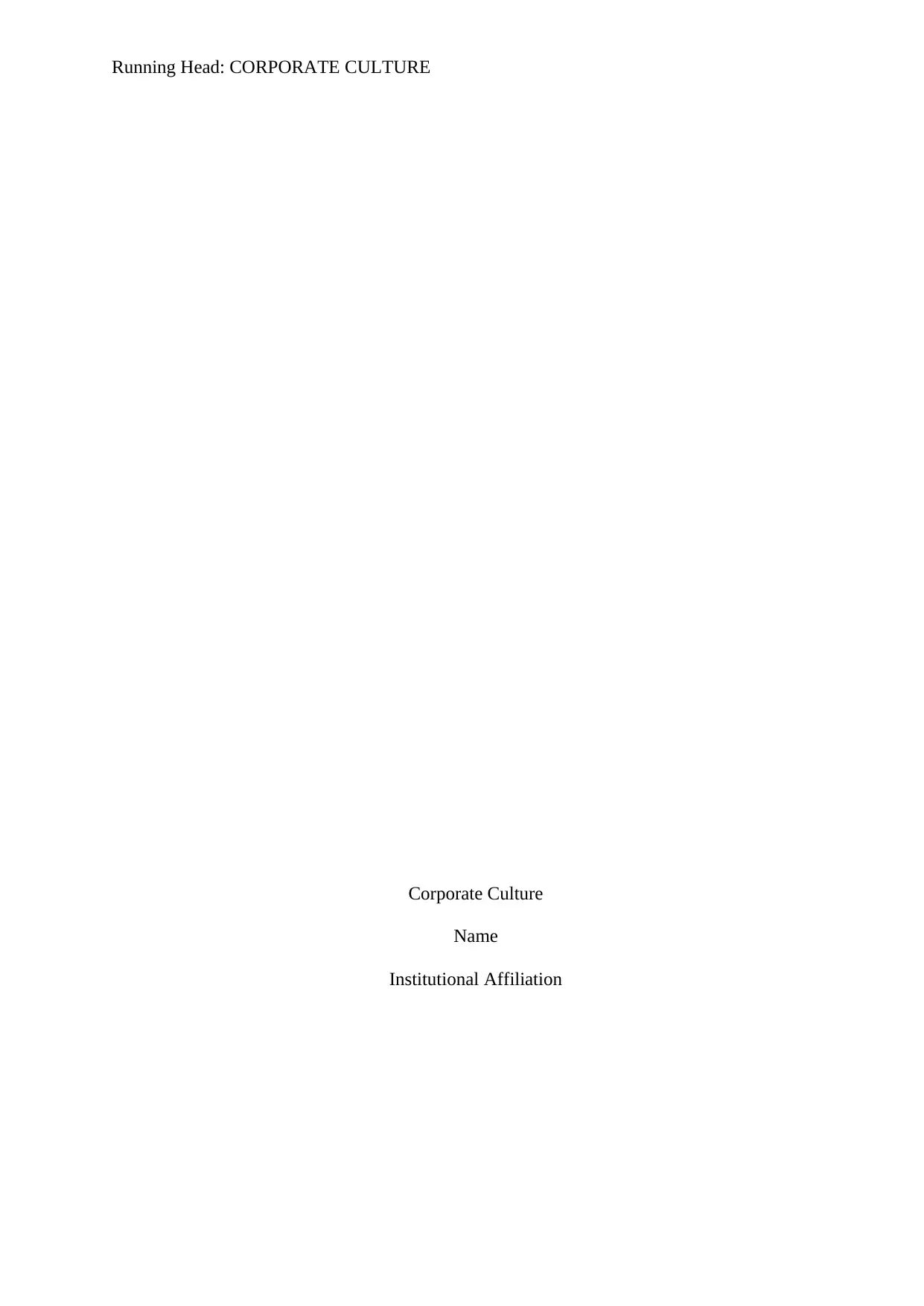
Running Head: CORPORATE CULTURE
Corporate Culture
Name
Institutional Affiliation
Corporate Culture
Name
Institutional Affiliation
Paraphrase This Document
Need a fresh take? Get an instant paraphrase of this document with our AI Paraphraser
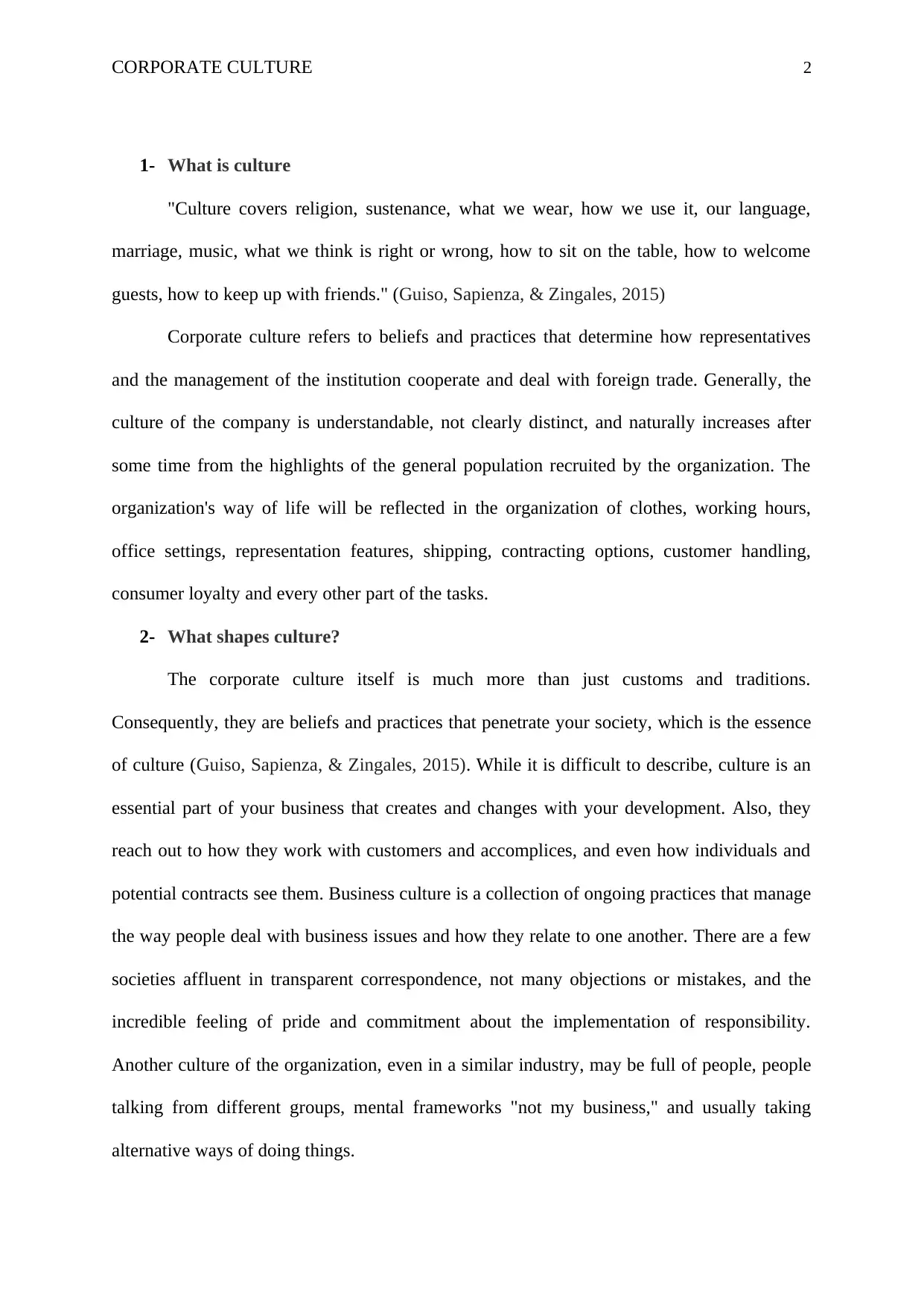
CORPORATE CULTURE 2
1- What is culture
"Culture covers religion, sustenance, what we wear, how we use it, our language,
marriage, music, what we think is right or wrong, how to sit on the table, how to welcome
guests, how to keep up with friends." (Guiso, Sapienza, & Zingales, 2015)
Corporate culture refers to beliefs and practices that determine how representatives
and the management of the institution cooperate and deal with foreign trade. Generally, the
culture of the company is understandable, not clearly distinct, and naturally increases after
some time from the highlights of the general population recruited by the organization. The
organization's way of life will be reflected in the organization of clothes, working hours,
office settings, representation features, shipping, contracting options, customer handling,
consumer loyalty and every other part of the tasks.
2- What shapes culture?
The corporate culture itself is much more than just customs and traditions.
Consequently, they are beliefs and practices that penetrate your society, which is the essence
of culture (Guiso, Sapienza, & Zingales, 2015). While it is difficult to describe, culture is an
essential part of your business that creates and changes with your development. Also, they
reach out to how they work with customers and accomplices, and even how individuals and
potential contracts see them. Business culture is a collection of ongoing practices that manage
the way people deal with business issues and how they relate to one another. There are a few
societies affluent in transparent correspondence, not many objections or mistakes, and the
incredible feeling of pride and commitment about the implementation of responsibility.
Another culture of the organization, even in a similar industry, may be full of people, people
talking from different groups, mental frameworks "not my business," and usually taking
alternative ways of doing things.
1- What is culture
"Culture covers religion, sustenance, what we wear, how we use it, our language,
marriage, music, what we think is right or wrong, how to sit on the table, how to welcome
guests, how to keep up with friends." (Guiso, Sapienza, & Zingales, 2015)
Corporate culture refers to beliefs and practices that determine how representatives
and the management of the institution cooperate and deal with foreign trade. Generally, the
culture of the company is understandable, not clearly distinct, and naturally increases after
some time from the highlights of the general population recruited by the organization. The
organization's way of life will be reflected in the organization of clothes, working hours,
office settings, representation features, shipping, contracting options, customer handling,
consumer loyalty and every other part of the tasks.
2- What shapes culture?
The corporate culture itself is much more than just customs and traditions.
Consequently, they are beliefs and practices that penetrate your society, which is the essence
of culture (Guiso, Sapienza, & Zingales, 2015). While it is difficult to describe, culture is an
essential part of your business that creates and changes with your development. Also, they
reach out to how they work with customers and accomplices, and even how individuals and
potential contracts see them. Business culture is a collection of ongoing practices that manage
the way people deal with business issues and how they relate to one another. There are a few
societies affluent in transparent correspondence, not many objections or mistakes, and the
incredible feeling of pride and commitment about the implementation of responsibility.
Another culture of the organization, even in a similar industry, may be full of people, people
talking from different groups, mental frameworks "not my business," and usually taking
alternative ways of doing things.
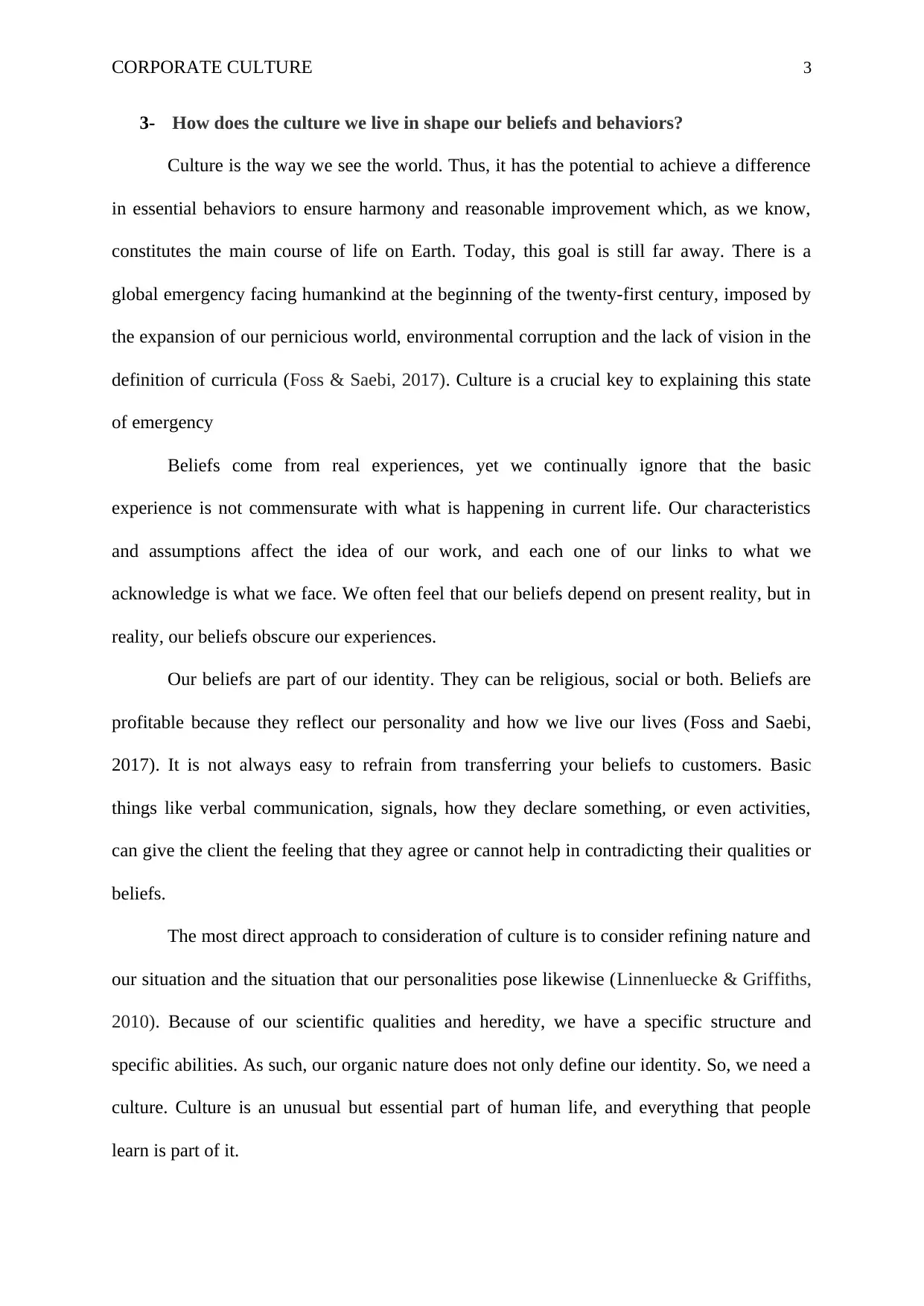
CORPORATE CULTURE 3
3- How does the culture we live in shape our beliefs and behaviors?
Culture is the way we see the world. Thus, it has the potential to achieve a difference
in essential behaviors to ensure harmony and reasonable improvement which, as we know,
constitutes the main course of life on Earth. Today, this goal is still far away. There is a
global emergency facing humankind at the beginning of the twenty-first century, imposed by
the expansion of our pernicious world, environmental corruption and the lack of vision in the
definition of curricula (Foss & Saebi, 2017). Culture is a crucial key to explaining this state
of emergency
Beliefs come from real experiences, yet we continually ignore that the basic
experience is not commensurate with what is happening in current life. Our characteristics
and assumptions affect the idea of our work, and each one of our links to what we
acknowledge is what we face. We often feel that our beliefs depend on present reality, but in
reality, our beliefs obscure our experiences.
Our beliefs are part of our identity. They can be religious, social or both. Beliefs are
profitable because they reflect our personality and how we live our lives (Foss and Saebi,
2017). It is not always easy to refrain from transferring your beliefs to customers. Basic
things like verbal communication, signals, how they declare something, or even activities,
can give the client the feeling that they agree or cannot help in contradicting their qualities or
beliefs.
The most direct approach to consideration of culture is to consider refining nature and
our situation and the situation that our personalities pose likewise (Linnenluecke & Griffiths,
2010). Because of our scientific qualities and heredity, we have a specific structure and
specific abilities. As such, our organic nature does not only define our identity. So, we need a
culture. Culture is an unusual but essential part of human life, and everything that people
learn is part of it.
3- How does the culture we live in shape our beliefs and behaviors?
Culture is the way we see the world. Thus, it has the potential to achieve a difference
in essential behaviors to ensure harmony and reasonable improvement which, as we know,
constitutes the main course of life on Earth. Today, this goal is still far away. There is a
global emergency facing humankind at the beginning of the twenty-first century, imposed by
the expansion of our pernicious world, environmental corruption and the lack of vision in the
definition of curricula (Foss & Saebi, 2017). Culture is a crucial key to explaining this state
of emergency
Beliefs come from real experiences, yet we continually ignore that the basic
experience is not commensurate with what is happening in current life. Our characteristics
and assumptions affect the idea of our work, and each one of our links to what we
acknowledge is what we face. We often feel that our beliefs depend on present reality, but in
reality, our beliefs obscure our experiences.
Our beliefs are part of our identity. They can be religious, social or both. Beliefs are
profitable because they reflect our personality and how we live our lives (Foss and Saebi,
2017). It is not always easy to refrain from transferring your beliefs to customers. Basic
things like verbal communication, signals, how they declare something, or even activities,
can give the client the feeling that they agree or cannot help in contradicting their qualities or
beliefs.
The most direct approach to consideration of culture is to consider refining nature and
our situation and the situation that our personalities pose likewise (Linnenluecke & Griffiths,
2010). Because of our scientific qualities and heredity, we have a specific structure and
specific abilities. As such, our organic nature does not only define our identity. So, we need a
culture. Culture is an unusual but essential part of human life, and everything that people
learn is part of it.
⊘ This is a preview!⊘
Do you want full access?
Subscribe today to unlock all pages.

Trusted by 1+ million students worldwide
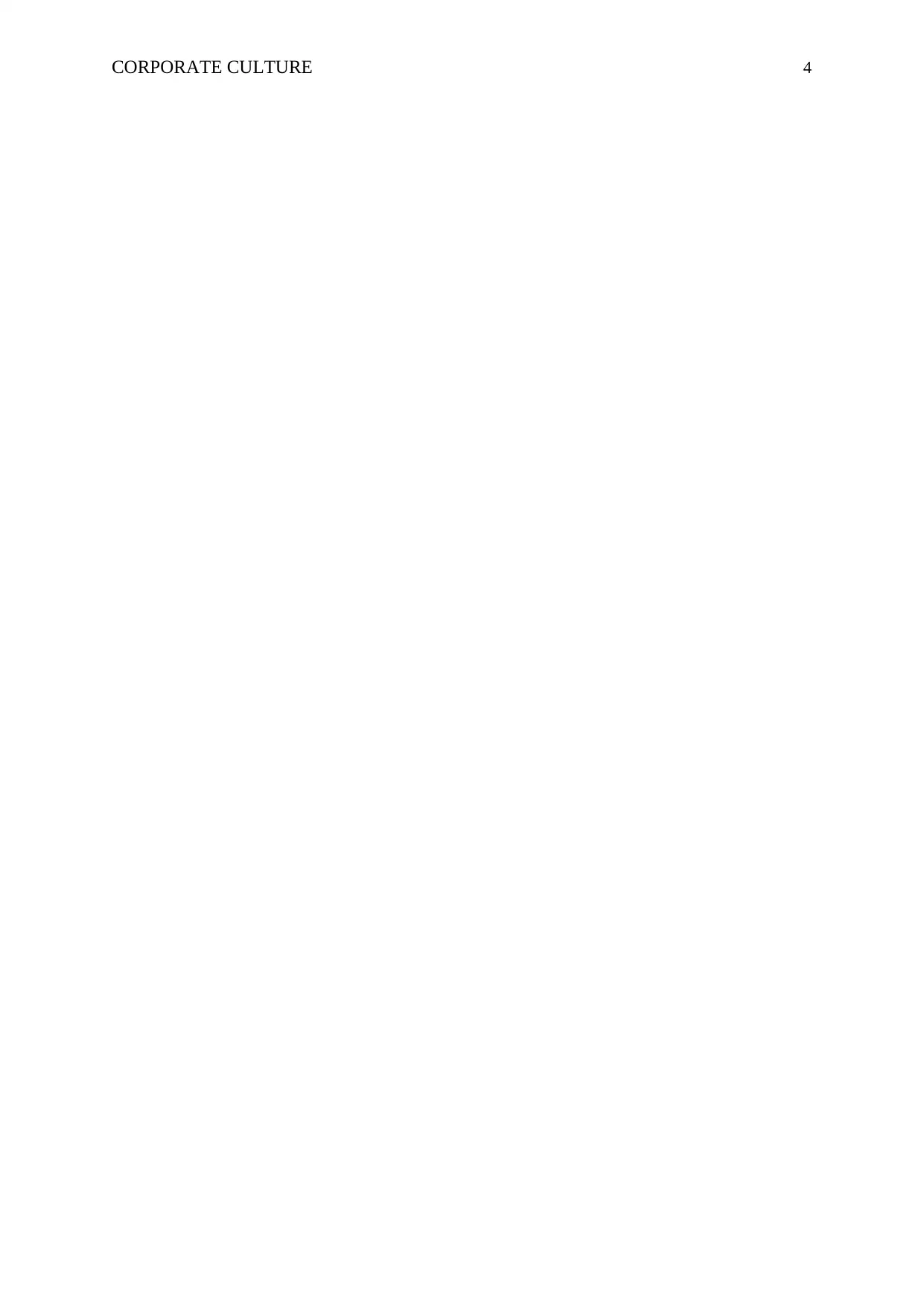
CORPORATE CULTURE 4
Paraphrase This Document
Need a fresh take? Get an instant paraphrase of this document with our AI Paraphraser
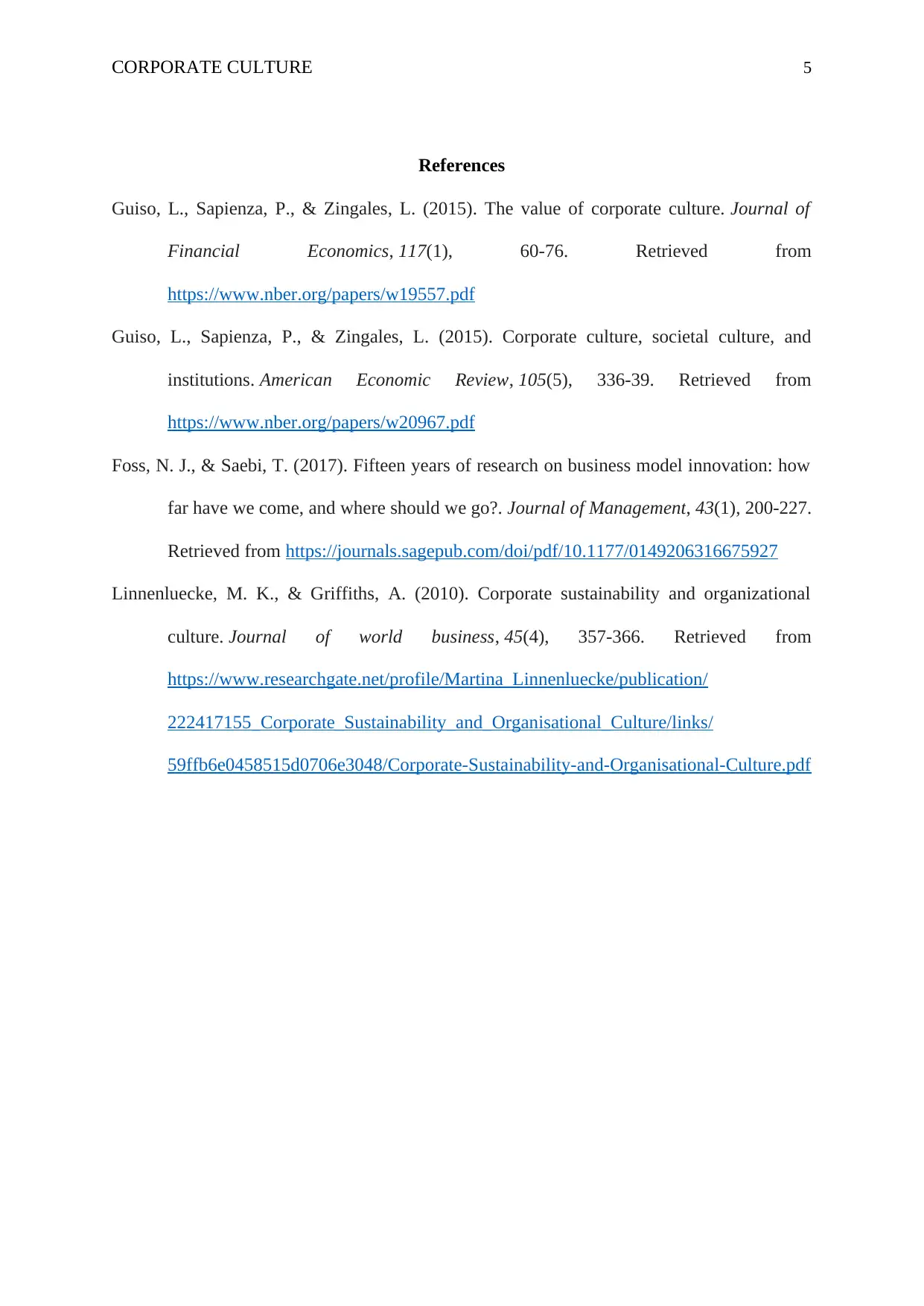
CORPORATE CULTURE 5
References
Guiso, L., Sapienza, P., & Zingales, L. (2015). The value of corporate culture. Journal of
Financial Economics, 117(1), 60-76. Retrieved from
https://www.nber.org/papers/w19557.pdf
Guiso, L., Sapienza, P., & Zingales, L. (2015). Corporate culture, societal culture, and
institutions. American Economic Review, 105(5), 336-39. Retrieved from
https://www.nber.org/papers/w20967.pdf
Foss, N. J., & Saebi, T. (2017). Fifteen years of research on business model innovation: how
far have we come, and where should we go?. Journal of Management, 43(1), 200-227.
Retrieved from https://journals.sagepub.com/doi/pdf/10.1177/0149206316675927
Linnenluecke, M. K., & Griffiths, A. (2010). Corporate sustainability and organizational
culture. Journal of world business, 45(4), 357-366. Retrieved from
https://www.researchgate.net/profile/Martina_Linnenluecke/publication/
222417155_Corporate_Sustainability_and_Organisational_Culture/links/
59ffb6e0458515d0706e3048/Corporate-Sustainability-and-Organisational-Culture.pdf
References
Guiso, L., Sapienza, P., & Zingales, L. (2015). The value of corporate culture. Journal of
Financial Economics, 117(1), 60-76. Retrieved from
https://www.nber.org/papers/w19557.pdf
Guiso, L., Sapienza, P., & Zingales, L. (2015). Corporate culture, societal culture, and
institutions. American Economic Review, 105(5), 336-39. Retrieved from
https://www.nber.org/papers/w20967.pdf
Foss, N. J., & Saebi, T. (2017). Fifteen years of research on business model innovation: how
far have we come, and where should we go?. Journal of Management, 43(1), 200-227.
Retrieved from https://journals.sagepub.com/doi/pdf/10.1177/0149206316675927
Linnenluecke, M. K., & Griffiths, A. (2010). Corporate sustainability and organizational
culture. Journal of world business, 45(4), 357-366. Retrieved from
https://www.researchgate.net/profile/Martina_Linnenluecke/publication/
222417155_Corporate_Sustainability_and_Organisational_Culture/links/
59ffb6e0458515d0706e3048/Corporate-Sustainability-and-Organisational-Culture.pdf
1 out of 5
Related Documents
Your All-in-One AI-Powered Toolkit for Academic Success.
+13062052269
info@desklib.com
Available 24*7 on WhatsApp / Email
![[object Object]](/_next/static/media/star-bottom.7253800d.svg)
Unlock your academic potential
Copyright © 2020–2026 A2Z Services. All Rights Reserved. Developed and managed by ZUCOL.





